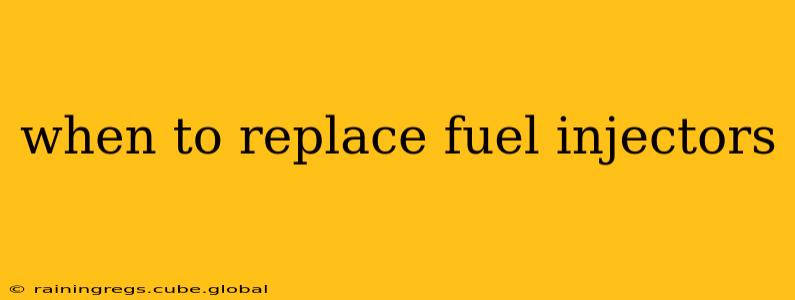Fuel injectors are vital components in your vehicle's engine, responsible for precisely metering and delivering fuel into the combustion chamber. Over time, these injectors can wear out, leading to decreased performance and potentially costly repairs. Knowing when to replace them is crucial for maintaining your vehicle's health and efficiency. This comprehensive guide will help you understand the signs indicating it's time for a fuel injector replacement.
What are the Signs My Fuel Injectors Need Replacing?
Several symptoms can point towards failing fuel injectors. Ignoring these can lead to more significant engine problems down the line. Here are some key indicators:
- Rough Idle: A rough or shaky idle is a common sign. This occurs because the fuel injectors aren't delivering fuel consistently to the cylinders, causing inconsistent combustion.
- Poor Fuel Economy: Noticeably lower gas mileage than usual is a strong indicator. Inefficient fuel delivery means your engine is working harder to achieve the same power output, consuming more fuel.
- Engine Misfires: Misfires result from a cylinder not firing properly due to insufficient fuel. You might hear a sputtering or knocking sound from the engine, and feel a loss of power.
- Hard Starting: Difficulty starting your engine, especially when it's cold, is another symptom. Insufficient fuel delivery can make it harder for the engine to ignite.
- Black Smoke from Exhaust: Excessive black smoke from your tailpipe indicates rich fuel mixture. This signifies that the fuel injectors are delivering more fuel than necessary, leading to incomplete combustion.
- Hesitation or Stalling: If your vehicle hesitates or stalls while accelerating, it could be due to inconsistent fuel delivery from faulty injectors.
- Engine Light (Check Engine Light): A consistently illuminated check engine light, often accompanied by a diagnostic trouble code (DTC) related to fuel injectors, is a clear warning sign. Have your vehicle scanned by a mechanic to diagnose the specific code.
How Long Do Fuel Injectors Typically Last?
The lifespan of fuel injectors varies depending on several factors, including vehicle make and model, driving habits, fuel quality, and maintenance. Generally, fuel injectors can last anywhere from 100,000 to 200,000 miles or even longer with proper care. However, harsh driving conditions or using low-quality fuel can significantly reduce their lifespan.
What Happens if I Don't Replace Failing Fuel Injectors?
Neglecting failing fuel injectors can lead to several serious problems:
- Severe Engine Damage: Prolonged misfires can cause damage to catalytic converters, oxygen sensors, and other engine components.
- Reduced Engine Performance: Your vehicle will become increasingly sluggish and underpowered.
- Increased Emissions: Inefficient combustion leads to higher emissions, potentially causing your vehicle to fail emissions testing.
- Costly Repairs: Addressing the resulting engine damage from neglecting faulty injectors can be far more expensive than replacing the injectors themselves.
How Much Does Fuel Injector Replacement Cost?
The cost of replacing fuel injectors varies depending on the vehicle, the number of injectors needing replacement, and labor costs. Generally, you can expect to pay anywhere from a few hundred dollars to several thousand dollars for the entire repair.
Can I Clean My Fuel Injectors Instead of Replacing Them?
In some cases, cleaning your fuel injectors might be a viable option, especially if the problem is due to buildup rather than mechanical failure. However, cleaning is only a temporary solution, and replacement is often necessary in the long run. A professional mechanic can assess the condition of your injectors and determine the best course of action.
How Can I Prevent Premature Fuel Injector Failure?
Regular maintenance plays a significant role in extending the lifespan of your fuel injectors. Here are some tips:
- Use High-Quality Fuel: Avoid using low-quality fuel, which can contain contaminants that clog injectors.
- Regular Oil Changes: Regular oil changes help keep your engine clean and prevent debris from damaging injectors.
- Avoid Aggressive Driving: Harsh acceleration and braking can put extra stress on the fuel system.
- Regular Fuel System Cleaning: Periodically using a fuel system cleaner can help remove deposits and maintain injector performance.
By being attentive to the signs of failing fuel injectors and taking proactive steps, you can ensure your vehicle runs smoothly and efficiently for many miles to come. Remember, regular maintenance and addressing problems promptly are key to avoiding costly repairs down the road.
